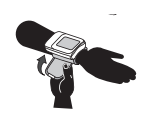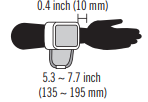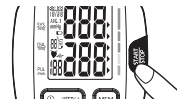Homedics BPW-O200 Wrist Blood Pressure Monitor User Manual
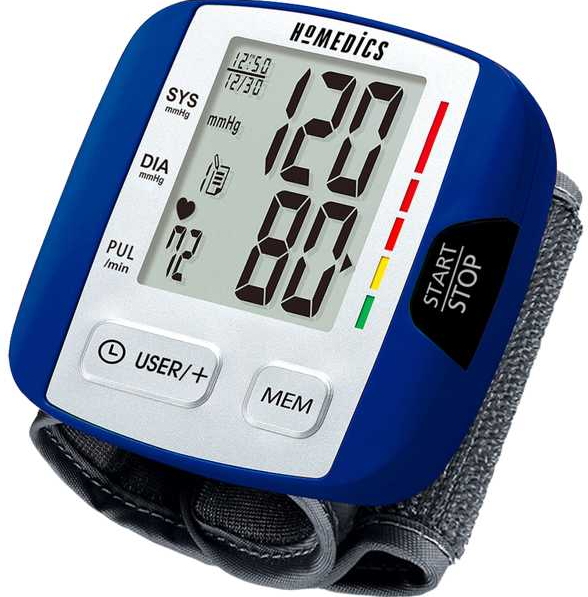
IMPORTANT PRODUCT NOTICES AND SAFETY INSTRUCTIONS
When using your blood pressure monitor, basic precautions should always be followed. Please read and follow all instructions and warnings before using this product. Save these instructions for future reference.
- Please note that this is a home healthcare product only and it is not intended to serve as a substitute for the advice of a physician or medical professional.
- This device uses oscillometric method to measure systolic and diastolic blood pressure, as well as heart rate.
- Do not use this device for diagnosis or treatment of any health problem or disease. Measurement results are for reference only. Consult a healthcare professional for the interpretation of pressure measurements. Contact your physician if you have or suspect any medical problems. Do not change your medications without the advice of your physician or healthcare professional.
- This product is not suitable for people with arrhythmias. This device may have difficulty determining the proper blood pressure for pregnant women and for users with irregular heartbeat, diabetes, poor circulation of blood, kidney problems, or for users who have suffered a stroke.
- Not suitable for those undergoing intravenous injection on any limb or women with pre-eclampsia.
- For those who have undergone mastectomy or lymph colectomy surgery, it is recommended to take a measurement on the unaffected side.
- Excessive use may result in blood flow interference, which is likely to cause uncomfortable sensations, such as partial subcutaneous hemorrhage, or temporary numbness to your wrist. In general, these symptoms should not last long. However, if you do not recover in time, please seek advice from a medical professional.
ABOUT BLOOD PRESSURE
What is blood pressure?
Blood pressure is the pressure exerted on the artery walls while blood flows through the arteries. The pressure measured when the heart contracts and sends blood out of the heart is systolic (highest) blood pressure. The pressure measured when the heart dilates with blood flowing back into the heart is called diastolic (lowest) blood pressure.
Why measure your blood pressure?
Among today’s various health problems, those associated with high blood pressure are very common. High blood pressure dangerously correlates with cardiovascular diseases. Therefore, blood pressure monitoring is important for identifying those at risk.
Why do my readings vary?
Blood pressure is a body parameter that is subject to normal variations throughout the day. A single reading that is different from your and your doctor’s readings is not necessarily inaccurate. The average of several readings, taken under similar conditions, using the same arm, is preferred for accurate blood pressure readings.
BLOOD PRESSURE STANDARD
The table below contains defined levels of hypertension that are publicly available from the American Heart Association® (AHA 2017) (www.heart.org/ HEARTORG/Conditions/HighBloodPressure/KnowYourNumbers/UnderstandingBlood-Pressure-Readings_UCM_301764_Article.jsp#.WusfWogvy71). Users can compare their own blood pressure readings against these defined levels to determine if they may be potentially at increased risk.
NAME/FUNCTION OF EACH PART
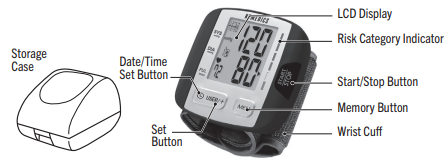
BATTERY INSTALLATION
- Slide the battery cover to open.
- Install or replace 2 AAA alkaline batteries in the battery compartment. Make sure the polarities “+” and “-” ends coincide with similar markings inside the compartment.
- Close the battery cover by sliding it back into place.
Replace the batteries if:
- The low battery symbol appears on the display.
- Nothing appears on the display when the power is switched on.
DATE AND TIME SET
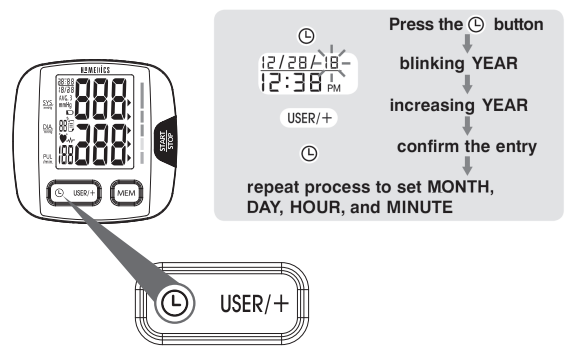
Press the DATE/TIME SET![]() button and the YEAR will flash on the screen. Press the USER/+ button to increase to desired YEAR; press the DATE/TIME SET
button and the YEAR will flash on the screen. Press the USER/+ button to increase to desired YEAR; press the DATE/TIME SET![]()
DISPLAY EXPLANATIONS
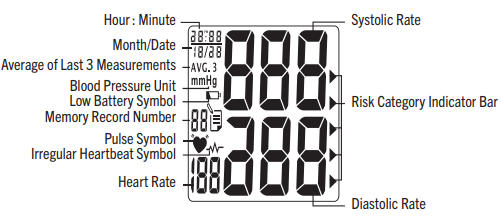
| Low Battery Symbol: Appears when batteries should be replaced. | |
|
| Pulse Symbol: Shows the heart rate per minute. |
| Risk Category Indicator: See the Blood Pressure Standard section for more information. | |
|
| Irregular Heartbeat Detector: See below for more information. |
| AVG.3 | Memory Average: Displays average of last 3 readings. |
| EE | Measurement Error: Adjust the cuff and keep the wrist steady during measurement. |
IRREGULAR HEARTBEAT DETECTOR
The appearance of the![]() icon indicates that a pulse irregularity consistent with an irregular heartbeat was detected during measurement. Usually, this is not a cause for concern. However, if the symbol appears often, we recommend you seek medical advice. Please note that the device does not replace a cardiac examination, but serves to detect pulse irregularities at an early stage.
icon indicates that a pulse irregularity consistent with an irregular heartbeat was detected during measurement. Usually, this is not a cause for concern. However, if the symbol appears often, we recommend you seek medical advice. Please note that the device does not replace a cardiac examination, but serves to detect pulse irregularities at an early stage.
Movement, shaking, or talking during the measurement can result in pulse irregularities that may cause the appearance of this icon. Therefore, it is of great importance to not move or talk during measurement. To determine the presence of an irregular heartbeat, the average of the heartbeat intervals is calculated with the first 3 normal effective heartbeat values. It is important to note that the average is not a strict mathematical averaging of all recorded intervals. At least 3 beats with 25% or greater difference from the average heartbeat interval will generate the![]() icon on the screen.
icon on the screen.
USING THE WRIST CUFF
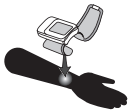
- Wrap the cuff snugly around the left wrist with the palm facing up and the monitor facing you. Do not make it too tight.

- Fold the remaining part of the wrist cuff back out of the way.

- Make sure that you leave approximately 1/4” to 1/2” from the palm and that there is no extra space between the cuff and wrist.
MEASUREMENT PROCEDURE
IMPORTANT:
It is extremely important that the cuff is at the same height as the heart. Having the cuff higher or lower may cause inaccurate results.
BEFORE MEASUREMENT
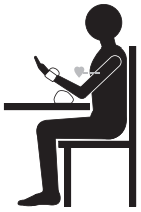
- Wait 1 hour after exercising, bathing, eating, drinking alcoholic or caffeinated beverages, or smoking before taking a measurement.
- Sit quietly and rest for 15 minutes; for any subsequent measurements, it is recommended to wait a minimum of 5 minutes.
- Take your blood pressure at normal body temperature.
DURING MEASUREMENT
- Do not talk or move your arm or hand muscles.
- Do not cross your legs. Sit with feet flat on the floor.
- Do not touch the cuff or monitor during measurement.
- Position the blood pressure monitor on your wrist.
- Place your elbow on the table and rest the back of your hand on the device storage case or other object.
- Rest your wrist on the armrest until it’s at the same height as your heart.
- Relax your hand and turn your palm upward.
- Do not use this device if your wrist has any wound or injury.
- Once the measurement has started, keep your wrist steady until the measurement is complete.
- Press the START/STOP button to turn the monitor ON.
- Press the USER/+ button to choose User 1 or 2.

- With the cuff wrapped around your wrist, press the START/STOP button. Do not inflate the cuff unless it is wrapped around your wrist. All digits will light up to check the display function. The checking procedure will be completed after about 1.5 seconds.

- After all, the symbols disappear, and the display will show “00”. The monitor is “Ready to Measure” and will automatically inflate the cuff to begin measurement.
- When the measurement is completed, the cuff will deflate entirely. Systolic pressure, diastolic pressure, and pulse will be shown simultaneously on the LCD screen. The measurement is then automatically stored in memory.
RECALLING VALUES FROM MEMORY
This monitor can be used by 2 individuals. Each user can store up to 30 measurements.
- Press the USER/+ button to select User 1 or 2.

- Press the MEM button to access the Memory

- If there is no data stored in memory, nothing (except for month, date, and time) will appear on the display. If there is data, the first reading will be the average of the last 3 measurements.
- Every new press of the MEM button will recall a previous reading. The latest reading will be recalled first.
- To stop recalling readings from memory, press the START/STOP button.

CLEARING VALUES FROM MEMORY
- Press the USER/+ button to select User 1 or 2.
- Press the MEM button to access the Memory.
- Press and hold the DATE/TIME SET buttons ( USER/+) at the same time while in memory recall mode, and the data for the selected user will be erased automatically.

CARE, MAINTENANCE, AND CLEANING
- Clean the blood pressure monitor body and cuff carefully with a slightly damp, soft Do not press. Do not wash cuff or use chemical cleaner on it. Never use thinner, alcohol, or petrol (gasoline) as cleaner.
- Leaky batteries can damage the Remove the batteries when the unit will not be used for a long time.
- Follow local ordinances and recycling instructions regarding disposal or recycling of the device and device components, including
- The unit is stored near freezing, allow it to acclimate to room temperature before
- This blood pressure monitor is not field-serviceable. You should not use any tool to open the device nor should you attempt to adjust anything inside the device. If you have any problems with this device, please contact HoMedics Consumer Relations (contact information can be found on the Warranty page).
- Do not immerse the unit in water as this will result in damage to the
- Do not subject the monitor or cuff to extreme temperatures, humidity, moisture, or direct Protect from dust.
- Do not fold the cuff and tubing
- Do not disassemble the monitor or If in need of repair, refer to the Warranty section of this manual.
- Do not subject the monitor to extreme shocks (do not drop on the floor).
- Do not inflate the cuff unless wrapped around
- Do not wrap the cuff around body parts other than your
- Do not drop or insert any object into any opening or
- Always store the unit in the storage case between
- This monitor may not meet its performance specifications if stored outside these temperature and humidity ranges:
TROUBLESHOOTING
If any abnormality arises during use, please check the following points.
| SYMPTOMS | POSSIBLE CAUSES | CORRECTION |
| The unit does not turn on when the START/STOP button is pushed. | Batteries have run down. | Replace them with 2 new AAA alkaline batteries. |
| Battery polarities (+/ -) have been positioned incorrectly. | Re-insert the batteries in the correct positions. | |
| EE measurement error symbol shown on display or the blood pressure value is displayed excessively low (or high). | The wrist cuff has been positioned on the arm incorrectly. | Re-wrap the cuff properly so that it is positioned correctly. Take new measurement. |
| Did you talk or move during measurement? | Keep your arm steady during measurement. Measure again. Refer to “Measurement Procedure” instructions. | |
| Shaking of the arm with the cuff on. | ||
| E1 error symbol shown on display. | Air circuit abnormality. The cuff tube may not be plugged into the monitor correctly. | Check cuff connection. Take new measurements. See the “Using the Wrist Cuff” section. |
| E2 error symbol is shown on display. | Inflation pressure exceeding 300 mmHg. | Switch the unit off and then turn it back on. Take new measurements. |
| E3 error symbol shown on display. | Error determining measurement data. | Re-wrap the cuff properly so that it is positioned correctly. Take new measurement. |
| EP error symbol is shown on display. | System error. | Remove batteries. After 1 minute, re-insert the batteries. Take new measurements. |
SPECIFICATIONS
| Measurement Method: | Oscillometric |
| Rated Range of Cuff Pressure: | 0-300 mmHg |
| Measurement Range: | Pressure: 40~280 millimeters Mercury (mmHg) Pulse: 40~199 beats/minute |
| Rated Range of Determination: | 40-280 mmHg |
| Accuracy: | Pressure: ±3 mmHg Pulse: +5% Max. |
| Pressure Sensor: | Semiconductor |
| Inflation: | Automatic inflation (air pump) |
| Deflation: | Automatic air release control valve |
| Display: | Liquid Crystal Display |
| Memory: | 60 memory total for 2 users |
| Unit Dimensions: | 75 x 75 x 26 mm (L x W x H) 2.95 x 2.95 x 1.02 inch (L x W x H) |
| Unit Weight: | 79.5 g + 5 g (2.80 oz + 0.18 oz) (without cuff and batteries) |
| Cuff Size: | 135 ~ 195 mm (approx. 5.3 ~ 7.7 inch) |
| Storage/Transportation Environment: | Temperature: -25°C ~ 70°C (-13°F ~ 158°F) Humidity: < 93% RH |
| Operation Environment: | Temperature: 5°C ~ 40°C (41°F~104°F) Humidity: 15% ~ 93% RH |
| Atmospheric pressure: | 700 hPa ~ 1060 hPa |
| Power Supply: | DC 3 V, AAA “LR03” (1.5 V) alkaline battery x 2 |
| Battery Life: | Approx. 250 measurements |
| Product Life: | 5 years (4 times a day) |
| Sleeping Mode: | Without any operation for 1 minute, the device automatically shuts off |
| Accessories: | Instruction manual, storage case, 2 AAA (LR03) alkaline batteries |
|
| Internally powered equipment Type BF equipment IP22-degrees of protection provided by enclosures Not suitable for use in the presence of a flammable anesthetic mixture with air, oxygen, or nitrous oxide. Continuous operation with short-time loading. |
|
| Follow instructions for use. |
POTENTIAL FOR ELECTROMAGNETIC INTERFERENCE
To avoid inaccurate results caused by electromagnetic interference between electrical and electronic equipment, do not use the device near a cell phone or microwave oven. For most wireless communication devices, it is recommended to maintain a distance of 10.8 feet (3.3m) in order to avoid electromagnetic interference. This device complies with Part 15 of the FCC Rules.
FEDERAL COMMUNICATIONS COMMISSION COMPLIANCE STATEMENT
Changes or modifications to this equipment not expressly approved by the manufacturer could void the user’s authority to operate the equipment. This equipment has been tested and found to comply with the limits for a Class B digital device, pursuant to Part 15 of the FCC Rules. These limits are designed to provide reasonable protection against harmful interference in a residential installation. This equipment generates, uses, and can radiate radio frequency energy and, if not installed and used in accordance with the instructions, may cause harmful interference to radio communications.
However, there is no guarantee that interference will not occur in a particular installation. If this equipment does cause harmful interference to radio or television reception, which can be determined by turning the equipment off and on, the user is encouraged to try to correct the interference by one or more of the following measures:
- Reorient or relocate the receiving
- Increase the separation between the equipment and
- Connect the equipment to an outlet on a circuit different from that to which the receiver is
- Consult the dealer or an experienced radio/TV technician for
ELECTROMAGNETIC COMPATIBILITY (EMC)
Guidance and manufacturer’s declaration – electromagnetic emissions
The device is intended for use in the electromagnetic environments listed below, and should only be used in such environments:
| Emissions test | Compliance | Electromagnetic environment – guidance |
| RF emissions CISPR 11 | Group 1 | RF energy is used only to maintain device‘s operation. Therefore, its RF emissions are so low that it’s not likely to cause any interference in nearby electronic equipment. |
| RF emissions CISPR 11 | Class B | |
| Harmonic emissions IEC 61000-3-2 | Not Applicable | The device is suitable for use in all establishments, including domestic establishments, and those directly connected to the public low-voltage power supply network that supplies buildings used for domestic purposes. |
| Voltage fluctuations/flicker emissions IEC 61000-3-3 | Not Applicable |
Guidance and manufacturer’s declaration – electromagnetic immunity
The device is intended for use in the electromagnetic environments listed below, and should only be used in such environments:
| Immunity test | IEC 60601 test level | Compliance level | Electromagnetic environment-guidance |
| Electrostatic discharge (ESD) IEC 61000- 4-2 | ± 8 kV contact discharge ± 15 kV air discharge | ± 8 kV contact discharge ±15 kV air discharge | The relative humidity should be at least 5% |
| Power frequency magnetic field IEC 61000- 4-8 | 30 A/m 50 or 60 Hz | 30 A/m 50 or 60 Hz | Power frequency magnetic fields should be at levels characteristic of a typical location in a typical commercial or hospital environment. Recommended separation distance I r = (m) 188 where I is the current in amperes in a power bus or an appliance wire and r is the recommended separation distance between your device and the power bus or application wire, in meters (m). |
LIMITED 5-YEAR WARRANTY
HoMedics sells its products with the intent that they are free of defects in manufacture and workmanship for a period of 5 years from the date of original purchase, except as noted below. HoMedics warrants that its products will be free of defects in material and workmanship under normal use and service. This blood pressure monitor meets the simulated measurement cycles test requirement per EN1060-3, part 8.10. This warranty extends only to consumers and does not extend to Retailers.
To obtain warranty service on your HoMedics product, contact a Consumer Relations representative by telephone at 1-800-466-3342 for assistance. Please make sure to have the model number of the product available. HoMedics does not authorize anyone, including but not limited to Retailers, the subsequent consumer purchaser of the product from a Retailer, or remote purchasers, to obligate HoMedics in any way beyond the terms set forth herein. This warranty does not cover damage caused by misuse or abuse; accident; the attachment of any unauthorized accessory; alteration to the product;
improper installation; unauthorized repairs or modifications; improper use of electrical/power supply; loss of power; dropped product; malfunction or damage of an operating part from failure to provide manufacturers recommended maintenance; transportation damage; theft; neglect; vandalism; or environmental conditions; loss of use during the period the product is at a repair facility or otherwise awaiting parts or repair; or any other conditions whatsoever that are beyond the control of HoMedics.
DOWNLOAD PDF
Homedics BPW-O200 Wrist Blood Pressure Monitor User Manual



